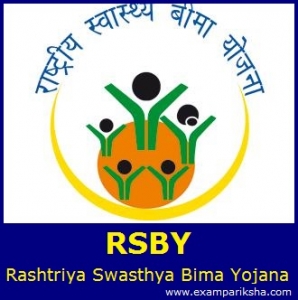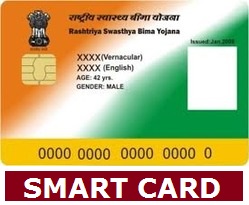The Rashtriya Swasthya Bima Yojana (RSBY) is an scheme for unorganized sector workers below poverty line (BPL) and their families first launched in the Financial year 2007-08 and it became fully operational from 1st April 2008. The ‘’Unorganized workers social Security Act, 2008” came into operation from 31st December 2008.
Rashtriya Swasthya Bima Yojana (RSBY) was initially launched by the Ministry of Labour and Employment, to provide health insurance coverage for the Below Poverty Line (BPL) families.
Starting 1 April 2015, the Rashtriya Swasthya Bima Yojana (RSBY) of the Labour and Employment Ministry will now be implemented under the Ministry of Health and Family Welfare.
Objective of RSBY:
To provide protection to BPL households from financial liabilities which arise out of out-of-pocket (OOP) payments for health shocks that involve hospitalization.
Need for RSBY:
In India, the estimated workforce amounts to 47 crores, out of which only 8 crore are organized workers while 39 crore are workers in the unorganized sector.
Even though the Government is providing ‘free’ health services, the policy makers have identified that the ‘free’ government health services are not meeting the needs of the community. This is the reason why a great deal of out-of-pocket expenses are still taking place, which lead to indebtedness in turn. The poorest sections of society bear the brunt of it, as is evident.
Moreover, since 94% of the workforce in India works in the unorganized sector and, hence, does not enjoys the desired social security cover available in the organised sector. There is a need for a Government sponsored health insurance cover.
The target group of RSBY is the Poor, illiterate and migratory worker of unorganized sector.
Details of Rashtriya Swasthya Bima Yojana (RSBY) :
The RSBY scheme has been appreciated by the World Bank, the UN and the ILO, as one of the world’s best health insurance schemes.
- It provides for IT-enabled and smart –card-based cashless health insurance.
- The scheme is a cashless system to overcome the issues of reimbursment and migration coupled with illetaracy of the target group.
- The beneficiaries under RSBY are entitled to hospitalization coverage up to Rs. 30,000 for majority of the diseases which require hospitalization.
- The Government has also fixed the package rates for the hospitals regarding a large number of interventions.
- Pre-existing conditions are covered from the first day and there is no age limit set.
- The coverage under the RSBY extends to five members of the family including the head of household, spouse and up to three dependents.
- The beneficiaries are required to pay only Rs. 30 as the registration fee.
- The Central and State Government pay the premium to the insurer that is selected by the State Government on a competitive bidding basis.
The Funding of RSBY:
- The Ratio of 75:25 is followed generally. And 90:10 in case of NE States and J&K.
- Central Government’s contribution – 75% (90 percent in case of North-Eastern States and J&K) of the estimated annual premium. Along with the cost of Smart Card.
- The respective State Government’s contribution – 25% (10 percent in case of North-Eastern States and J&K) of the annual premium.
What are the Unique Features of RSBY:

Smart Card of Rashtriya Swasthya Bima Yojana (RSBY)
The RSBY scheme is different from other schemes in various important aspects:
- Information Technology (IT) Intensive – IT applications are used for the social sector scheme on a large scale where every beneficiary family is issued a biometric enabled smart card which contains their fingerprints and photographs. Also all the hospitals empanelled under the RSBY are IT enabled and hence, connected to the server located at the district level. This is meant to ensure a smooth data flow with regards to service utilization.
- Empoweres the beneficiary – RSBY provides the participating BPL households freedom of choice between public and private hospitals and also makes them a potential client which is worth attracting on account of the significant revenues that the hospitals stand to earn through this scheme.
- Portability of RSBY– A key feature of RSBY is that the beneficiary who has been enrolled in a particular district of any state will be able to use his or her smart card in any of the RSBY empanelled hospital across the country. This makes the scheme unique as well as beneficial to the poor families which migrate from one place to the other in search of work. Adittionally, the cards can be split for the migrant workers to carry a share of the coverage with them separately, if required.
- Cash less and Paperless transactions – The beneficiary of RSBY gets cashless benefit in any RSBY empanelled hospitals.
- Safe and Secure – The use of biometric enabled smart card and a key management system makes the RSBY scheme safe and foolproof. The key management system in RSBY ensures that card is handed over to the correct beneficiary and accountability is ensured in terms of issuance and usage of the smart card. With the biometric-enabled Smart Card, it is ensured that only the real beneficiary uses the smart card.
- RSBY is a Business Model for all Stakeholders – This scheme has been designed as a business model for each stakeholder in the social sector scheme with incentives for all.
- For Hospitals – The incentive is to provide treatment to a large number of beneficiaries since it is paid according to per beneficiary treated.





